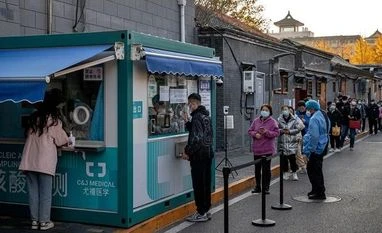China’s factory and services activity contracted further in November as a record number of Covid cases prompted widespread movement curbs, further damaging the economy’s fragile outlook.
The official manufacturing purchasing managers index fell to 48 this month, the National Bureau of Statistics said on Wednesday, the lowest reading since April and worse than an estimate of 49 in a Bloomberg survey of economists.
The non-manufacturing index, which measures activity in the construction and services sectors, declined to 46.7 from 48.7 in October, also lower than the consensus estimate of 48. A reading below 50 indicates contraction, while anything above suggests expansion.
The economy is suffering increasing damage from tightened virus controls as Covid outbreaks spread in every province. Major cities like Guangzhou and Beijing have imposed new restrictions in recent weeks to limit movements, and the stringent measures even sparked protests in several cities.
Economic activity will likely continue to weaken in December and the first quarter of next year, according to Zhang Zhiwei, chief economist at Pinpoint Asset Management Ltd., adding that a reopening-fueled rebound seems set for the second half of 2023.
“At this early stage of reopening, more cities face rising number of Covid patients,” he said. “These cities have to impose restrictions to ‘flatten the curve.’ The economic cost is inevitable.”
China’s benchmark CSI 300 Index of stocks opened 0.3% lower when the data was released, but then quickly erased that loss to rise 0.3% as of 9:46 a.m. local time. The yuan traded onshore strengthened 0.26% to 7.1389 per dollar, while the yield on 10-year government bonds was little changed at 2.89%.
What Bloomberg Economics Says...
Recovery will be slow as China works out ways to live with the virus, but each new sign of economic weakness is likely to nudge in the direction of loosening Covid Zero. Any new approach will need to strike a delicate balance: boosting economic activity without allowing an unmanageable spread of the virus.
Road and subway traffic in big cities including Beijing plummeted in the past week, as public venues were closed and residents reduced their time outside the home.
About a quarter of China’s total gross domestic product is affected by lockdowns, according to a recent estimate from Nomura Holdings Inc. That was higher than the firm’s previous peak recording of 21% in April, when the whole of Shanghai was shut down to curb Covid cases.
Manufacturing PMI gauges measuring output, new orders, raw material inventories and employment all contracted in November at a faster pace than the month before. A sub-index measuring suppliers’ delivery times also fell further.
Manufacturing Sub-indexes Decline: - Output fell to 47.8 in November from 49.6 in October
- New orders decreased to 46.4, down from 48.1
- A sub-gauge measuring employment dropped to 47.4 from 48.3
- An index for suppliers’ delivery times declined to 46.7
“In November, Covid outbreaks brought negative impact to some firms’ production and operation. Production activity slowed, and product orders declined,” Zhao Qinghe, a senior statistician at the NBS, said in a statement.
While the government has taken steps to help the economy recently -- including lowering the amount of cash banks must hold in reserves and offering financing support to property developers -- the policies aren’t likely to be enough to shore up household and business confidence.
Bloomberg Economics downgraded its GDP growth forecast for this year to 3% from 3.5%, and trimmed next year’s projection to 5.1% from 5.7%. The International Monetary Fund said Tuesday it may have to trim its forecast for China’s growth because of Covid restrictions and property sector turmoil. The IMF currently sees China’s GDP expanding 3.2% this year and 4.4% in 2023.
Several economists say the central bank could provide more stimulus in the coming months as the global outlook makes it somewhat more favorable for China to ease monetary policy.
“Policymakers are working at full steam to create strong impetus for growth with stimulus packages,” said Bruce Pang, chief economist and head of research for Greater China at Jones Lang LaSalle Inc. He sees China’s economy as likely to return to a potential growth rate of over 5% “no earlier” than the second quarter of next year, assuming less disruptions from Covid outbreaks and curbs.
“Fortunately, authorities are sending signals of a more pragmatic attitude toward the economic roadmap, Covid policy and geopolitical relationships, all of which will help to deliver a gradual economic recovery for China,” he added.
Unlock 30+ premium stories daily hand-picked by our editors, across devices on browser and app.
Pick your 5 favourite companies, get a daily email with all news updates on them.
Full access to our intuitive epaper - clip, save, share articles from any device; newspaper archives from 2006.
Preferential invites to Business Standard events.
Curated newsletters on markets, personal finance, policy & politics, start-ups, technology, and more.
)